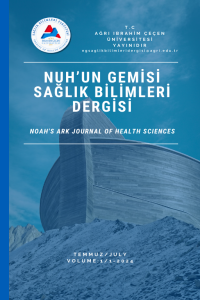Öz
Autism spectrum disorder (ASD) is a neurodevelopmental disorder characterized by significant clinical heterogeneity. It typically manifests within the first three years of life and is marked by restrictive, repetitive patterns of behavior, interests, and activities, as well as deficits in communication and social interaction. While there is no definitive cure for ASD, treatments generally focus on behavioral therapies aimed at improving the characteristic social, behavioral, and communicative symptoms of ASD. Individuals with ASD experience significant nutritional problems due to gastrointestinal system problems such as severe food selectivity and insufficient digestion and absorption of nutrients. This food selectivity leads many individuals with ASD to consume diets that are low in fiber, vitamins, and minerals, and generally of poor quality. The inadequate intake of macro and micronutrients and various dietary components in individuals with ASD can be both a cause and a consequence of the disorder. There are increasing studies in the literature showing that various vitamin and mineral deficiencies and supplements have effects on ASD. The aim of this review is to examine the possible role of micronutrient deficiencies and supplements in individuals with ASD, and in this context, various vitamins and minerals are discussed.
Anahtar Kelimeler
Supplementation micronutrient deficiency autism spectrum disorder
Kaynakça
- Adams, J. B. (2015). Vitamin/mineral supplements for children and adults with autism. Vitam Miner, 3(127), 2376-1318.
- Adams, J. B., Audhya, T., McDonough-Means, S., Rubin, R. A., Quig, D., Geis, E., ... & Lee, W. (2011). Effect of a vitamin/mineral supplement on children and adults with autism. BMC pediatrics, 11, 1-30.
- Adams, J. B., George, F., & Audhya, T. (2006). Abnormally high plasma levels of vitamin B6 in children with autism not taking supplements compared to controls not taking supplements. Journal of Alternative & Complementary Medicine, 12(1), 59-63.
- Al-Farsi, Y. M., Waly, M. I., Deth, R. C., Al-Sharbati, M. M., Al-Shafaee, M., Al-Farsi, O., ... & Ouhtit, A. (2013). Low folate and vitamin B12 nourishment is common in Omani children with newly diagnosed autism. Nutrition, 29(3), 537-541.
- Ali, A., Cui, X., & Eyles, D. (2018). Developmental vitamin D deficiency and autism: putative pathogenic mechanisms. The Journal of steroid biochemistry and molecular biology, 175, 108-118.
- Arija, V., Esteban-Figuerola, P., Morales-Hidalgo, P., Jardí, C., & Canals-Sans, J. (2023). Nutrient intake and adequacy in children with autism spectrum disorder: EPINED epidemiological study. Autism, 27(2), 371-388.
- Babaknejad, N., Sayehmiri, F., Sayehmiri, K., Mohamadkhani, A., & Bahrami, S. (2016). The relationship between zinc levels and autism: a systematic review and meta-analysis. Iranian journal of child neurology, 10(4), 1.
- Bari, B. A., Ivkovic, A., & Wininger, B. A. (2023). Mild vitamin C deficiency is common in the inpatient psychiatric setting. The Journal of clinical psychiatry, 84(4), 47467.
- Beard, C. M., Panser, L. A., & Katusic, S. K. (2011). Is excess folic acid supplementation a risk factor for autism?. Medical hypotheses, 77(1), 15-17.
Öz
Otizm spektrum bozukluğu (OSB) önemli klinik çeşitlilik gösteren bir nörogelişimsel bozukluktur. Tipik olarak yaşamın ilk üç yılında ortaya çıkmakta ve kısıtlayıcı, tekrarlayan davranış, ilgi ve aktivite kalıplarının yanı sıra iletişim ve sosyal etkileşimdeki eksikliklerle kendini göstermektedir. OSB için kesin bir tedavi bulunmamakla birlikte, tedavi yöntemleri genellikle OSB'nin sosyal, davranışsal ve iletişimsel semptomlarını iyileştirmeye yönelik davranış terapilerine dayanmaktadır. OSB’li bireyler; ciddi besin seçiciliği, besinlerin sindirim ve emilimindeki yetersizlik gibi gastrointestinal sistem problemleri nedeniyle önemli beslenme sorunları yaşamaktadırlar. Bu besin seçiciliği; OSB’li bireylerin çoğunun düşük posa, vitamin ve mineral içeriğine sahip kalitesiz diyetler tüketmesine yol açmaktadır. OSB’li bireylerde makro ve mikro besin ögeleri ile çeşitli diyet bileşenlerinin yetersiz alımı hem OSB’nin nedeni hem de sonucu olabilmektedir. Literatürde çeşitli vitamin ve mineral eksiklikleri ile takviyelerinin OSB üzerinde etkileri olduğuna dair çalışmalar giderek artmaktadır. Bu derlemenin amacı, OSB’li bireylerde görülen mikro besin ögesi eksiklikleri ve takviyelerinin olası rolünü incelemektir ve bu kapsamda çeşitli vitamin ve mineraller ele alınmıştır.
Anahtar Kelimeler
Besin ögesi takviyesi mikro besin ögesi eksikliği otizm spektrum bozukluğu
Kaynakça
- Adams, J. B. (2015). Vitamin/mineral supplements for children and adults with autism. Vitam Miner, 3(127), 2376-1318.
- Adams, J. B., Audhya, T., McDonough-Means, S., Rubin, R. A., Quig, D., Geis, E., ... & Lee, W. (2011). Effect of a vitamin/mineral supplement on children and adults with autism. BMC pediatrics, 11, 1-30.
- Adams, J. B., George, F., & Audhya, T. (2006). Abnormally high plasma levels of vitamin B6 in children with autism not taking supplements compared to controls not taking supplements. Journal of Alternative & Complementary Medicine, 12(1), 59-63.
- Al-Farsi, Y. M., Waly, M. I., Deth, R. C., Al-Sharbati, M. M., Al-Shafaee, M., Al-Farsi, O., ... & Ouhtit, A. (2013). Low folate and vitamin B12 nourishment is common in Omani children with newly diagnosed autism. Nutrition, 29(3), 537-541.
- Ali, A., Cui, X., & Eyles, D. (2018). Developmental vitamin D deficiency and autism: putative pathogenic mechanisms. The Journal of steroid biochemistry and molecular biology, 175, 108-118.
- Arija, V., Esteban-Figuerola, P., Morales-Hidalgo, P., Jardí, C., & Canals-Sans, J. (2023). Nutrient intake and adequacy in children with autism spectrum disorder: EPINED epidemiological study. Autism, 27(2), 371-388.
- Babaknejad, N., Sayehmiri, F., Sayehmiri, K., Mohamadkhani, A., & Bahrami, S. (2016). The relationship between zinc levels and autism: a systematic review and meta-analysis. Iranian journal of child neurology, 10(4), 1.
- Bari, B. A., Ivkovic, A., & Wininger, B. A. (2023). Mild vitamin C deficiency is common in the inpatient psychiatric setting. The Journal of clinical psychiatry, 84(4), 47467.
- Beard, C. M., Panser, L. A., & Katusic, S. K. (2011). Is excess folic acid supplementation a risk factor for autism?. Medical hypotheses, 77(1), 15-17.
Ayrıntılar
| Birincil Dil | Türkçe |
|---|---|
| Konular | Beslenme Bilimi |
| Bölüm | Derlemeler |
| Yazarlar | |
| Yayımlanma Tarihi | 30 Temmuz 2024 |
| Gönderilme Tarihi | 20 Mayıs 2024 |
| Kabul Tarihi | 11 Temmuz 2024 |
| Yayımlandığı Sayı | Yıl 2024 Cilt: 1 Sayı: 1 |


